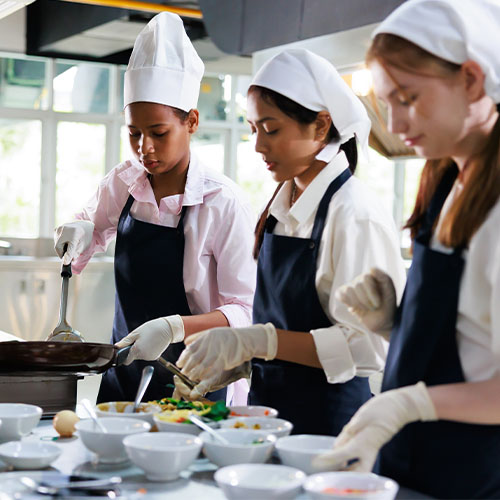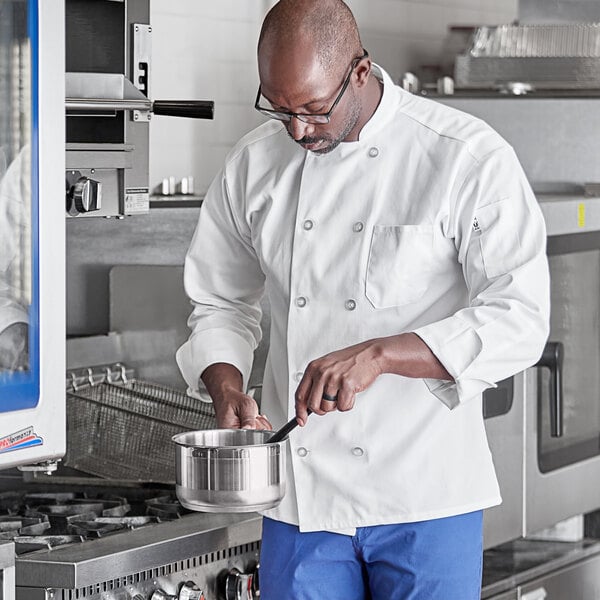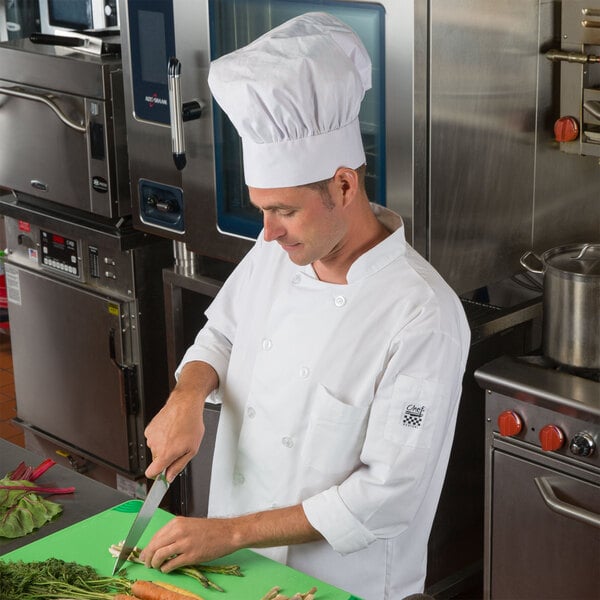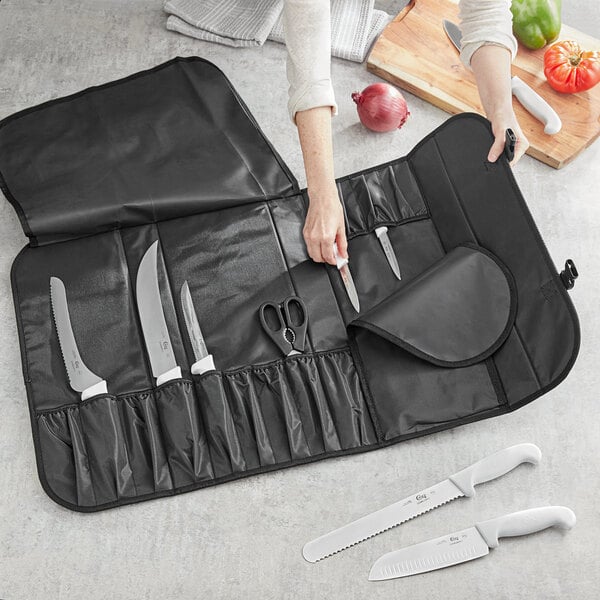
Starting a culinary career is an exciting path with many ways to break into the industry. One of those entryways is to attend a culinary school. Whether you’re a seasoned foodservice professional or you’ve never stepped foot in a commercial kitchen, a culinary education can help you develop the skills needed to advance your career or open your own restaurant. So where do you start? We’ll walk you through the process of applying to a culinary school so you can decide if it's the right fit for you.
How Much Does Culinary School Cost?

Before you consider attending a culinary school, you’re probably wondering about the cost. There’s no “one-size-fits-all” answer because there are several types of culinary programs with different associated costs. A four-year program at a prestigious culinary school will be more costly than a two-year program at a community college. To give you an idea of how much a culinary education will cost, here are some national averages:
Culinary Arts Certificate - $17,000 - $47,000
Associate of Culinary Arts - $35,000 - $56,000
Bachelor of Culinary Arts - $47,000 - $120,000
If those prices are giving you sticker shock, don’t lose hope. There are ways to mitigate the cost of a culinary education. In addition to financing and student loan options, you can make culinary school a reality with some smart compromises.
- In-state vs. Out-of-State - In-state schools cost less for tuition than out-of-state schools. Look for schools in your state to find programs on the lower end of the tuition range.
- Commute - Living on campus may provide the traditional college experience, but the cost of room and board is pricey. You can cut down on tuition costs by commuting to a local school.
- Online Programs - Believe it or not, there are culinary programs that can be completed entirely online. If you are set on getting a degree from an out-of-state school, find out if they offer an online program.
- Community College - Many community colleges are starting to offer two-year culinary arts programs. Community college is a more affordable option that will help you save on tuition.
What About Grants and Scholarships?
If you're a recent high school grad or you've never attended college before, the world of financial aid may seem mysterious. It's not as complicated as you might think, and most college students receive grants to help pay for their education. The first step is to fill out a FAFSA form (Free Application for Federal Student Aid). This can be done online and it determines your eligibility for federal, state, and college grants.
You can find scholarships by doing a simple internet search. It takes a little bit of research, but there are numerous scholarships available for those who are willing to put in the effort. WebstaurantStore offers scholarships for culinary students who meet certain qualifications. The great thing about grants and scholarships is that you don't have to pay that money back!
Is Culinary School Right for You?

With the question of cost out of the way, you should ask yourself if culinary school is right for you. Becoming a chef is not an easy road and working in a commercial kitchen isn't the glamorous environment it's often painted to be. There are some common traits and skills that will help you to be successful in culinary school and beyond.
- Passion for Food - Are you truly passionate about food? Someone who delights in the culinary arts is always trying new recipes and reviewing online restaurant menus for fun. Maybe they own dozens of cookbooks and obsess over food content on social platforms. However it manifests itself, passion is the requirement that trumps everything else. If you aren't passionate about food and cooking, finding the drive to be successful will be very difficult.
- Good Attendance - In culinary school and your future foodservice career, you'll need to have an open schedule. Your courses will require almost perfect attendance to fulfill all your credits. It's not the best path for someone who wants to take time off and travel frequently. You'll also work nights, weekends, and many holidays when you enter the workforce.
- Stamina - Working in the foodservice industry is physically demanding, more so than anyone realizes. You'll spend the majority of your shift on your feet, working around hot equipment, and dodging your busy coworkers. It can be a frantic environment that requires physical and mental stamina.
- Dexterity - It helps to be good with your hands because you'll work with all types of kitchen tools and equipment.
- Ability to Multitask - Cooking or baking at home is a less stressful experience because it's a controlled environment. The stakes are higher in a commercial kitchen where you'll be performing several tasks at once and working with a team of chefs. Multitasking and staying calm under pressure are essential skills for a culinary career.
- Willingness to Serve - At its core, the culinary world is a service industry. You'll be feeding customers and your success depends on making those people happy. It takes a certain level of humility to be successful in a career where you serve others on a daily basis.
Culinary School Requirements

Can anyone apply to culinary school? For the most part, yes! As long as you meet some basic requirements, nothing is standing in your way. You don't need special experience or knowledge, but it does help your chances if you can display a passion for cooking. These are some of the standard requirements to be considered for a culinary program (specific requirements will vary by school):
- Meet Age Requirement - Many schools require that you meet a minimum age requirement of 16. If you're under 18, you'll need written permission from a parent or guardian.
- High School Diploma or Equivalent - You must show proof of a high school diploma or a completed GED program.
- Application - To be considered for enrollment, an application for admission will need to be completed.
- Application Fee - Most admission applications require a nonrefundable processing fee ranging from $25 to $50.
- Admissions Interview or Essay - You may be asked to submit an essay or statement of purpose with your application. Some colleges require a face-to-face admissions interview. This is your chance to explain why you want to pursue a culinary career and emphasize what sets you apart from other candidates.
- Recommendation Letter - Not all schools require a recommendation letter, but it can help boost your chances of acceptance.
Does Everyone Get Accepted?
No, not everyone gets accepted to culinary school when they apply. Even though many culinary schools have high acceptance rates, there are limited spaces available. If you apply late or don't have all the requirements in hand, you might not be accepted for the program. Preparation is key, so apply early and make sure you thoroughly research the admission requirements for your chosen program.
Back to TopTypes of Culinary Degrees

When it comes to culinary degrees and areas of concentration, you have options. Learn more about culinary degrees below:
Culinary Degree vs Certificate
Many culinary schools offer a certificate program (sometimes called a "diploma program") that can be completed in less than a year. The main differences between a culinary certificate and a degree are that the certificate program is shorter and more focused on a specific area of study. Degree programs are broad and may also require general education classes to provide you with a more well-rounded education. Which is right for you? It depends on how much time you want to invest. A certificate can be a great way to boost your current skill set if you already work in the industry. But if you are seeking a high-level job, a degree may be required by employers.
Difference Between Associates and Bachelors
Both associate and bachelor's programs present you with a degree when you complete the program. An associate degree usually takes about two years to complete and requires fewer credits. A bachelor's program takes four years to complete and covers more courses than an associate program. You have to decide which type of degree will benefit you the most. Many graduates take their associate degrees and get the most out of them with hard work and determination. However, in some cases, a bachelor's degree is like a stamp of approval that opens more doors. One option is to start with an associate degree and then decide if you want to continue with a bachelor's program.
There are many types of foodservice careers you can pursue. Maybe you are more interested in the business and management side of things than the actual cooking aspect. These are some common areas of study:
- Culinary Arts - A culinary arts major will provide you with a foundational education that covers many aspects of foodservice. You'll learn cooking techniques, flavor principles, and food science. Culinary arts will prepare you for a variety of roles in the industry.
- Baking and Pastry Arts - If you lean more towards baking than cooking, this is the program for you. You'll learn about bread baking, cake decorating, and measurement conversions. A degree in baking and pastry arts will prepare you for a role as a pastry chef or bakery owner.
- Restaurant and Foodservice Management - Great chefs need a great management team to oversee all the other aspects of running a successful restaurant. If you love food and you're a born leader, a management role could be the right fit for you. A restaurant management program blends a mix of culinary courses with marketing, event planning, and business operations.
- Hospitality Management - The hospitality industry comprises foodservice, recreation, and tourism. A degree in hospitality management will prepare you for management roles at casinos, resorts, and cruise ships.
Culinary School Essentials

Since you'll spend a lot of time performing hands-on tasks, you'll need the right kitchen tools for the job. Most culinary schools provide you with a tool kit that includes all the necessary items you'll use in your classes. These are some of the chef essentials you'll use throughout your coursework:
- Chef Uniform - During your culinary lab courses, you'll be expected to wear a proper chef's uniform with a chef coat, apron, and chef hat.
- Chef Knives and Sharpener - To learn basic cutting techniques (insert link to Knife Cuts here), you'll need a set of professional chef knives and a sharpening steel.
- Spatulas, Spoons, and Whisks - You'll get a lot of use out of these basic kitchen utensils.
- Thermometers - Thermometers come in handy for a variety of tasks, from temping steaks to candy making.
- Kitchen Ruler - A ruler might seem out of place in a culinary tool kit, but kitchen rulers help you make accurate measurements when you're prepping ingredients and plating food.
- Measuring Spoons - Every chef needs the right tools to accurately measure ingredients.
- Backpack and Knife Roll - Culinary schools often include a backpack and knife roll in your tool kit so you can carry your essentials to class.
Note: This list isn't inclusive of all the tools you'll use in culinary school. If you have a specific area of study, like pastry arts, your tool kit will look a bit different.
Top Culinary Schools

When you start your search for the right culinary school, there are several factors to keep in mind. The culinary program, location, and tuition costs are important. You'll also want to consider the acceptance rate, campus size, and quality of student life. We've made a list of ten of the most highly reviewed culinary schools in the US to help you get started:
- Louisiana Culinary Institute (Baton Rouge, LA)
- Culinary Institute LENOTRE (Houston, TX)
- Walnut Hill College (Philadelphia, PA)
- Escoffier School of Culinary Arts - Boulder Campus (Boulder, CO)
- Stratford University (Alexandria, VA)
- Johnson & Wales University - Charlotte Campus (Charlotte, NC)
- Monroe College - Bronx/New Rochelle (Bronx, NY)
- The Culinary Institute of America (Hyde Park, NY)
- Johnson & Wales University- Providence Campus (Providence, RI)
- Fox Valley Technical College (Appleton, WI)
Culinary School FAQ
If you're still looking for answers, check out some common culinary school questions below:
Do I Need to Go to Culinary School to Become a Chef?
No, you don't have to go to culinary school to become a chef. On-the-job experience in the foodservice industry is there for the taking if you're a hard worker and you don't mind starting at the bottom. Many professional cooks will tell you they started as a dishwasher or line cook and worked their way up.
Am I Too Old for Culinary School?
No, maximum age is not a determining factor for culinary school acceptance as long as you can perform the physical tasks required. You don't have to be a recent high school grad to go back to school. Not everyone receives their education on the same timeline, and that's okay. Many adult students pursue a culinary education later in life after learning what really makes them happy.
Does GPA Matter for Culinary School?
Most culinary schools don't require you to provide your high school GPA, but some do.
Is Culinary School Different from College?
Yes, culinary school is more hands-on than a traditional college education. You will spend most of your time in the kitchen learning cooking techniques and gaining culinary experience. However, many programs require that you complete some credits in areas like math, liberal arts, and business management.
Back to TopNow that you have a better understanding of culinary school and its requirements, you can make an informed decision about your future career. Depending on what type of chef you want to be, you can choose different areas of study. If you already work in the industry and want to level up your skills, a certificate program might be the answer. Many accredited schools across the country offer different types of programs to meet your needs.





